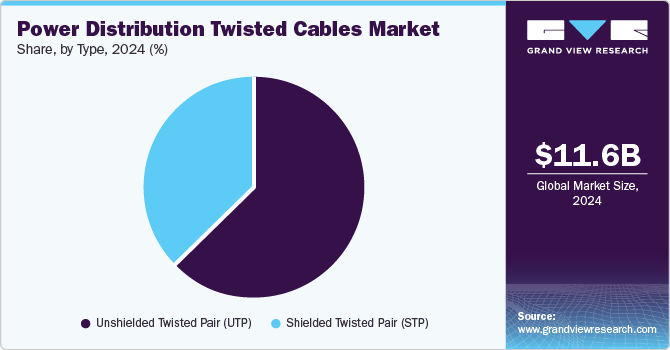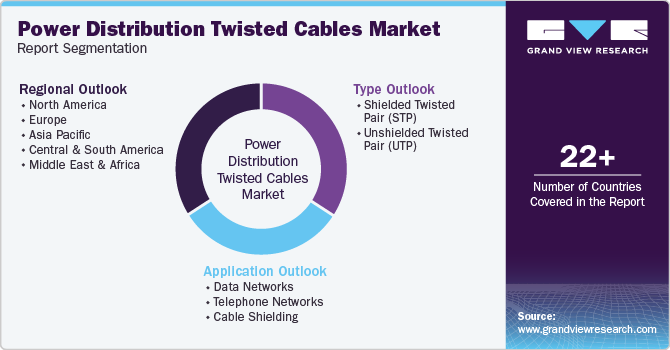
Power Distribution Twisted Cables Market Size, Share & Trends Analysis Report By Application (Data Networks, Telephone Networks, Cable Shielding), By Type, By Region, And Segment Forecasts, 2025 - 2030
- Report ID: GVR-4-68040-514-6
- Number of Report Pages: 100
- Format: PDF
- Historical Range: 2018 - 2024
- Forecast Period: 2025 - 2030
- Industry: Energy & Power
Market Size & Trends
The global power distribution twisted cables market size was estimated at USD 11.64 billion in 2024 and is projected to grow at a CAGR of 5.2% from 2025 to 2030. As urbanization and industrialization expand globally, a reliable and efficient power distribution system becomes more critical. Power distribution twisted cables play an essential role in transmitting electricity from substations to end users, and their ability to deliver high-quality performance in terms of stability and efficiency has contributed significantly to their growing demand. The increasing need to enhance electrical infrastructure to support the expanding global energy requirements has created substantial growth opportunities for this market.

The rapid adoption of renewable energy sources, such as solar and wind power, which require robust and efficient power distribution systems, further proliferate the market. Integrating these renewable energy sources into existing grids involves complex power distribution systems that rely heavily on high-quality cables for smooth and effective transmission. Twisted cables, known for their flexibility and reliability, are ideal for ensuring that energy from renewable sources is efficiently transported over long distances. The push for cleaner, more sustainable energy solutions is expected to continue fuelling market growth as governments and organizations aim to meet climate goals.
Technological advancements and innovations in cable manufacturing are also accelerating market growth. Developing cables that can handle higher voltages and operate in extreme weather conditions without compromising performance has increased demand for these products. Innovations such as using advanced materials like high-performance polymers and improved insulation coatings have increased the durability and lifespan of twisted cables, making them a preferred choice for power distribution. Moreover, smart grid technologies, which require sophisticated cables capable of simultaneously handling data and electrical transmission, contribute to market expansion.
As the global electrical infrastructure ages, there is a growing emphasis on upgrading power distribution systems to improve safety, reduce outages, and prevent fire hazards. Twisted cables are designed to meet stringent safety standards, and their ability to withstand environmental stressors such as extreme temperatures, humidity, and mechanical damage makes them highly suitable for critical infrastructure. The growing awareness of the need for resilient power systems drives investments in modernizing power grids, further propelling the demand for twisted cables.
Drivers, Opportunities & Restraints
As cities expand and new industries are established, the need for efficient, reliable, and scalable power distribution systems has intensified. Twisted cables, known for their superior flexibility, durability, and ability to handle higher voltage levels, ensure smooth transmission and distribution of electricity over long distances. In addition, the growing shift towards renewable energy sources such as wind, solar, and hydroelectric power requires reliable and efficient infrastructure for energy distribution, further driving the demand for advanced power distribution cables.
The rise of smart grids and the integration of smart meters present significant growth opportunities for the market. Smart grids require sophisticated, flexible, high-performance cables to handle electricity transmission and data communication for real-time monitoring and control. With their ability to support high-frequency signals alongside electrical current, Twisted cables are well-suited for these modern energy distribution networks. Moreover, the increasing focus on upgrading and modernizing aging infrastructure, especially in developed countries, offers considerable opportunities for replacing and installing new cables in both urban and rural areas. With their expanding power distribution needs, developing economies also present untapped markets for twisted cables, offering long-term growth potential.
While twisted cables offer superior performance, their price point can be a barrier for certain market segments, especially in cost-sensitive regions or for small-scale projects. Moreover, competition from alternative cable technologies, such as armored cables and non-twisted cables, poses a challenge in terms of market penetration.
Application Insights
The need for high-capacity, low-latency data transmission systems has soared as the world becomes more interconnected and reliant on digital technologies. These cables facilitate stable, high-performance data transmission, meeting the growing needs of businesses, cloud providers, and telecom companies.
Telephone networks is anticipated to register the fastest CAGR over the forecast period. As telephone networks continue to evolve with mobile and fixed-line communication technology advancements, the need for efficient and high-capacity transmission mediums is paramount. With the increasing demand for clearer, more stable calls and the expansion of voice and data services, these cables are becoming vital in upgrading and expanding telephone network infrastructure worldwide.
Type Insights
UTP cables are widely used due to their affordability and efficiency in supporting data transmission across various applications, including telecommunication and networking. Their simple design, without additional shielding, reduces production costs, making them an attractive option for businesses looking to build or expand their communication networks. As both emerging and established markets experience increased connectivity demands, UTP cables provide a viable solution for the growing needs of power distribution and communication systems.

Shielded Twisted Pair (STP) is anticipated to register the fastest CAGR over the forecast period. STP cables, which include an additional shielding layer around the twisted pairs of wires, provide better protection against electromagnetic interference (EMI) than unshielded cables. As industries rely more on high-speed data transmission, such as in telecom networks, data centers, and industrial applications, the demand for STP cables has surged. These cables are designed to ensure minimal signal loss and data degradation, making them ideal for environments with high levels of electrical interference, where performance and reliability are critical.
Regional Insights
The power distribution twisted cables market in Asia Pacific has seen a significant rise in the demand for power distribution twisted cables, driven by various factors shaping the region's energy infrastructure. Countries such as China and India heavily invest in infrastructure development, including power generation and distribution networks. For instance, China's Belt and Road Initiative has led to extensive construction projects that require reliable power distribution systems. As industries expand and urban areas grow, the demand for efficient power distribution solutions increases, boosting the market for twisted cables.

North America Power Distribution Twisted Cables Market Trends
The power distribution twisted cables market in North America market is anticipated to grow significantly over the forecast period. As governments and industries focus on reducing carbon emissions, there has been a significant push towards integrating renewable energy into the grid. For instance, the U.S. Department of Energy has been actively promoting solar and wind energy projects, which require robust power distribution systems to handle the generated electricity efficiently.
Europe Power Distribution Twisted Cables Market Trends
The power distribution twisted cables market in Europe held a significant market share in 2024. The European Union's Green Deal and various national renewable energy targets have strongly pushed for integrating solar, wind, and hydropower into the power grid. Twisted cables' ability to handle the variable nature of renewable energy makes them an indispensable part of the energy transition.
Central & South America Power Distribution Twisted Cables Market Trends
The power distribution twisted cables market in Central & South America market is anticipated to register the fastest CAGR over the forecast period. Countries such as Brazil have substantially invested in renewable energy, particularly wind and solar power. For instance, Brazil’s installed capacity for renewable energy reached 194.1 gigawatts in 2023, accounting for approximately 55% of the region’s total renewable energy capacity. This growth necessitates robust power distribution infrastructure, including twisted cables that can handle the specific requirements of renewable installations, thus driving market demand.
Middle East & Africa Power Distribution Twisted Cables Market Trends
The power distribution twisted cables market in the Middle East & Africa held a significant market revenue share in 2024. As cities in the Middle East, such as Dubai, Abu Dhabi, and Riyadh, expand, the demand for reliable, efficient power distribution networks rises. These urban centers and growing industrial hubs in countries like Saudi Arabia, the UAE, and South Africa require advanced power distribution systems to support residential, commercial, and industrial energy needs.
Key Power Distribution Twisted Cables Company Insights
Some key players operating in the market include Prysmian Group, Nexans, and others.
-
Prysmian Group is a global energy and telecommunications cable systems company that produces high-quality cables and accessories for various applications, including power distribution, renewable energy, twisted cables, and telecommunications. The twisted cables are engineered to minimize electromagnetic interference and enhance signal integrity, making them ideal for industrial environments, infrastructure projects, and renewable energy systems.
-
Nexans specializes in developing and manufacturing high-tech, eco-responsible solutions for power distribution. The company focuses on providing integrated turnkey solutions that enhance the reliability and efficiency of electrical networks. Nexans provides twisted cables designed for power distribution systems, which are essential for transmitting electricity through medium-voltage (MV) and low-voltage (LV) networks.
Key Power Distribution Twisted Cables Companies:
The following are the leading companies in the power distribution twisted cables market. These companies collectively hold the largest market share and dictate industry trends.
- Prysmian Group
- Nexans
- Fujikura
- Southwire
- Sumitomo Corporation
- Belden
- KEI Industries
- Cords Cable Industries
- Amphenol
- Finolex Cables
- Encore Wire Corp
Power Distribution Twisted Cables Report Scope
|
Report Attribute |
Details |
|
Market size value in 2025 |
USD 12.23 billion |
|
Revenue forecast in 2030 |
USD 15.79 billion |
|
Growth rate |
CAGR of 5.2% from 2025 to 2030 |
|
Actual data |
2018 - 2024 |
|
Forecast period |
2025 - 2030 |
|
Quantitative Units |
Revenue in USD million/billion and CAGR from 2025 to 2030 |
|
Report coverage |
Volume forecast, revenue forecast, competitive landscape, growth factors, and trends |
|
Segments covered |
Application, type, region |
|
Regional scope |
North America; Europe; Asia Pacific; Central & South America; Middle East & Africa |
|
Country scope |
U.S.; Canada; Mexico; Germany; Spain; UK; France; Italy; Russia; China; India; Japan; Australia; Brazil; Argentina; Saudi Arabia; South Africa |
|
Key companies profiled |
Prysmian Group; Nexans; Fujikura; Southwire; Sumitomo Corporation; Belden; KEI Industries; Cords Cable Industries; Amphenol; Finolex Cables; Encore Wire CorpTop of Form |
|
Customization scope |
Free report customization (equivalent up to 8 analysts working days) with purchase. Addition or alteration to country, regional & segment scope. |
|
Pricing and purchase options |
Avail customized purchase options to meet your exact research needs. Explore purchase options |
Global Power Distribution Twisted Cables Market Report Segmentation
This report forecasts revenue and volume growth at global, regional, and country levels and provides an analysis of the latest industry trends in each of the sub-segments from 2018 to 2030. For this study, Grand View Research has segmented the global power distribution twisted cables market report based on application, type, and region.

-
Application Outlook (Revenue, USD Million, 2018 - 2030
-
Data Networks
-
Telephone Networks
-
Cable Shielding
-
-
Type Outlook (Revenue, USD Million, 2018 - 2030)
-
Shielded Twisted Pair (STP)
-
Unshielded Twisted Pair (UTP)
-
-
Regional Outlook (Revenue, USD Million, 2018 - 2030)
-
North America
-
U.S.
-
Canada
-
Mexico
-
-
Europe
-
Germany
-
UK
-
Spain
-
France
-
Italy
-
Russia
-
-
Asia Pacific
-
China
-
India
-
Japan
-
Australia
-
-
Central & South America
-
Brazil
-
Argentina
-
-
Middle East
-
Saudi Arabia
-
South Africa
-
-
Frequently Asked Questions About This Report
b. The global power distribution twisted cables market size was estimated at USD 11.64 billion in 2024 and is expected to reach USD 12.23 billion in 2025.
b. The global power distribution twisted cables market is expected to grow at a compound annual growth rate of 5.2% from 2025 to 2030 to reach USD 15.79 billion by 2030.
b. The data networks segment dominated the market with a revenue share of over 63.6% in 2024.
b. Some of the key vendors of the global power distribution twisted cables market are Prysmian Group; Nexans; Fujikura; Southwire; Sumitomo Corporation; Belden; KEI Industries; Cords Cable Industries; Amphenol; Finolex Cables; Encore Wire Corp.
b. The key factor that is driving the growth of the global power distribution twisted cables market is the increasing urban population and rapid industrial growth are driving the demand for efficient power distribution systems, leading to a greater need for twisted cables that can handle higher current capacities while minimizing electromagnetic interference.
We are committed towards customer satisfaction, and quality service.
"The quality of research they have done for us has been excellent."




